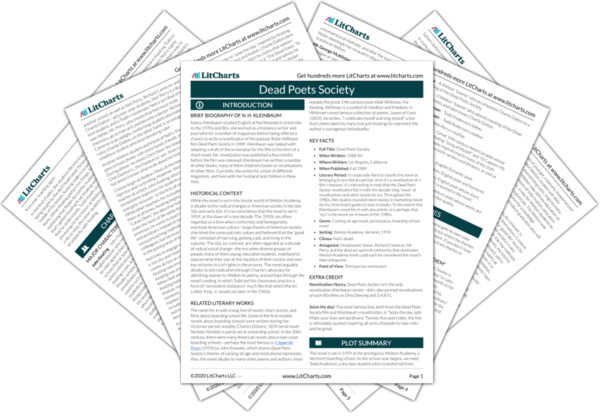Dead Poets Society is set at Welton Academy, an all-boys school. Furthermore, it takes place from 1959 to 1960—an era when the feminist movement was causing big changes in American society. So it’s no surprise that the novel has a lot to say about the relationships between men and women—in particular, between young men and young women.
Almost without exception, the relationships between men and women that Dead Poets Society depicts are romantic in nature. The male students of Welton Academy, especially Knox Overstreet, talk frequently about their desire for women. Because Welton is an all-boys school, women take on a near-mythic status in the students’ eyes: Welton students (at least the ones we’re introduced to in the novel) have so little experience interacting with young women that they think of women as mysterious, sublime, foreign creatures. John Keating’s lessons then appeal to his students’ conceptions of women, without challenging these conceptions in any way. He claims that one of the key uses of poetry is to “woo women,” and even suggests that in college, the women his students will meet will be “delectable” (not intelligent, independent, articulate, etc.). Unsurprisingly, the novel shows Keating’s disciples, especially Charlie Dalton and Knox Overstreet, using poetry to seduce the women to whom they’re most attracted.
The problem with such a view of women and poetry—and, one could argue, a major problem with the novel itself—is that it depicts women as objects whose only purpose is to be “won” by any means necessary: a viewpoint that is arguably quite sexist. Inspired by Keating’s talk of “wooing women,” the Welton students give in to their immature, clumsy desires, disrespecting women in the process. Most offensively, the novel shows Knox Overstreet using Keating’s “carpe diem” ideas to justify groping his crush, Chris, at a party—a scene that’s played for laughs of the “boys will be boys” variety (as Knox gropes Chris, he tells himself, “carpe diem” and “carpe breastum,” a clear example of how Keating’s lessons shape his thinking). Indeed, Knox later succeeds in “wooing” Chris with poetry and literature, and his molestation is hardly condemned. Knox’s fault, the novel strongly implies, isn’t that he takes advantage of a young woman’s body—it’s that he romances the young woman sloppily. In general, the novel seems to agree with the basic premise of Knox, Charlie, and the other Welton students’ view of women: women are passive muses, with limited subjectivity or independence, meant to be seduced (or at times, conned) into love. As another example, Charlie Dalton pens an op-ed about how women should be admitted to Welton—seemingly an assertion based in a desire for gender equality—but instead he simply argues that women are necessary for male students’ sexual gratification.
The overt sexism of the Welton students is more than just a moral problem for the book—it arguably represents a problem with Keating’s teaching methods, as the novel glorifies them. Keating wants his students to “seize the day,” and thinks his job is to teach them how to think for themselves and trust their own innate genius. But of course, the problem with telling a group of sexually frustrated teenage boys (all of whom, it’s assumed, are heterosexual and just trying to act like “real men”) to “trust in themselves” is that they might treat women disrespectfully.
Men, Women, and Love ThemeTracker

Men, Women, and Love Quotes in Dead Poets Society
“I feel like I've never been alive,” Charlie said sadly, as he watched Neil go. “For years, I've been risking nothing. I have no idea what I am or what I want to do. Neil knows he wants to act. Knox knows he wants Chris.”

Unlock explanations and citation info for this and every other Dead Poets Society quote.
Plus so much more...
Get LitCharts A+“God, I can't take it anymore! If I don't have Chris, I'll kill myself!”
I'd like to announce that I've published an article in the school paper, in the name of the Dead Poets Society, demanding girls be admitted to Welton, so we can all stop beating off.
Suddenly, he turned toward Chris again. He melted as his emotions took over. “Carpe breastum,” he said to himself, closing his eyes. “Seize the breast!”
Charlie held the receiver out to Nolan. “It's God. He said we should have girls at Welton,” Charlie said into the phone as a blast of laughter from the students filled the old stone chapel.











